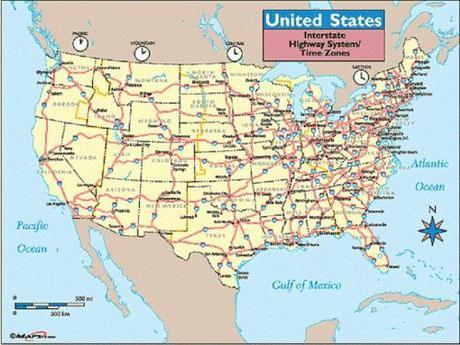 Long neglected by drowning-in-debt federal and state governments, America’s physical infrastructure of roads, highways, bridges, and dams is crumbling.
Long neglected by drowning-in-debt federal and state governments, America’s physical infrastructure of roads, highways, bridges, and dams is crumbling.
Yesterday, reversing a long-standing federal prohibition on most interstate tolling, in a 4-year $302 billion White House transportation bill, the Obama administration opened the door for states to collect tolls on interstate highways.
Ashley Halsey III reports for the Washington Post that the traditional funding source for interstate road repair, the 18.4-cent federal gas tax provided by the Highway Trust Fund, can no longer meet the need. That’s because the federal gas tax has eroded steadily as vehicles have become more energy efficient, an unintended consequence of the federal Clean Air Act.
Transportation Secretary Anthony Foxx said the highway trust fund would face a $63 billion shortfall over the next four years, and that the fund “could run dry” by this August. “States are already canceling or delaying projects because of the uncertainty.”
While providing tolling as an option to states, the White House proposal relies on funding from a series of corporate tax reforms, most of them one-time revenue streams that would provide a four-year bridge to close the trust-fund deficit and permit $150 billion more in spending than the gas tax will bring in.
But the corporate tax reform proposal has gotten a lukewarm reception even from Democrats in Congress. With the trust fund about to run into the red and the current federal highway bill set to expire Sept. 30, Congress cannot — as it is wont to do — keep “kicking the can down the road.”
Obama had first outlined the proposal for states to collect tolls on interstate highways almost two months ago. The proposal would:
- Leave it to states to decide whether they want to toll their interstates.
- Any new interstate tolling plans would have to be approved by the U.S. secretary of transportation.
- Priority would be given to repair of existing roadways and bridges, before any expansion of network.
- Expand popular loan-guarantee programs that have been used by state and local governments to fund projects.
- Double the funding — from $12.3 billion to $22.3 billion — for transit systems and intercity passenger rail.
- Increase the fine an automaker could face for a safety violation from the current $35 million to $300 million.
Terry O’Sullivan, president of the Laborers’ International Union of North America, favors a federal gas tax increase as “the most tested and logical way of meeting our critical investment needs.” The last time the federal gas tax was raised was in 1993 and has not been adjusted for inflation.
James Corless, director of the nonprofit Transportation for America, predicted that most Americans would accept tax increases to fund transportation. “When people understand where the dollars are being spent, the direct impact to their lives, they support paying their fair share.”
~Eowyn

